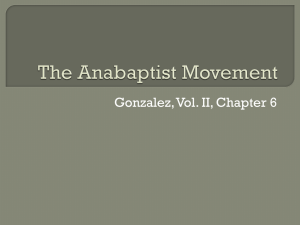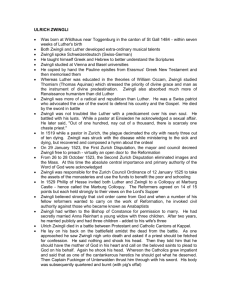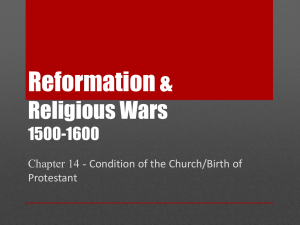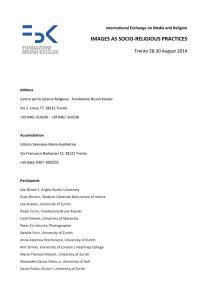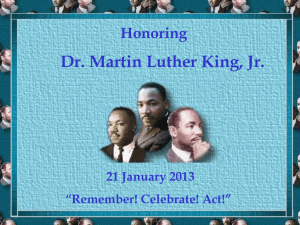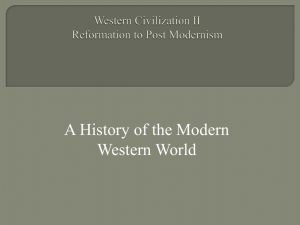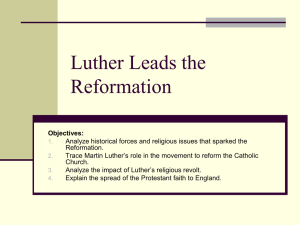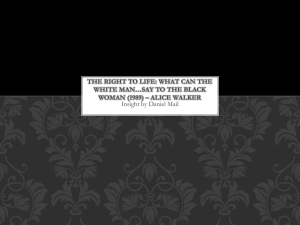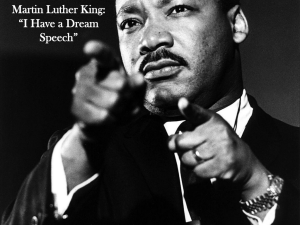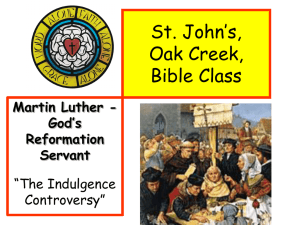Zwingli and Anabaptists
advertisement
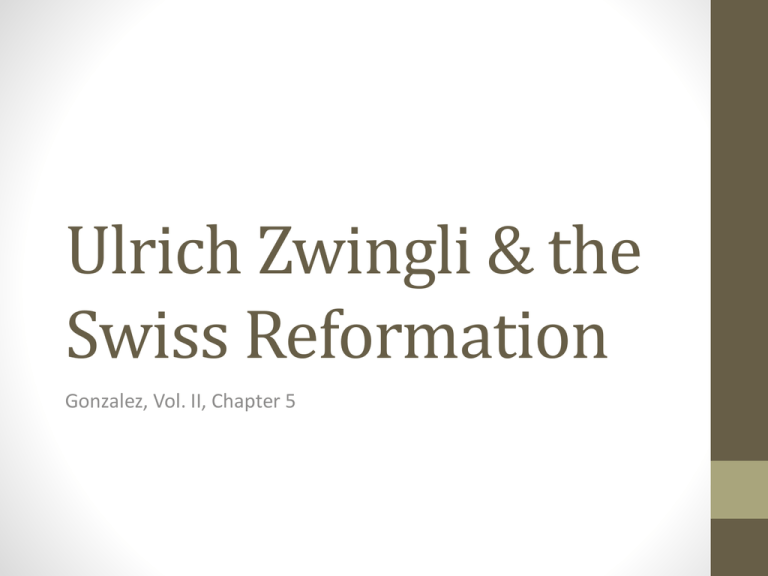
Ulrich Zwingli & the Swiss Reformation Gonzalez, Vol. II, Chapter 5 Ulrich Zwingli (1484-1531) • Sometimes spelled Huldrych Zwingli Zwingli’s resume… • Born in January 1484, less than two months after the birth of Martin Luther • In his early years he studied in Basel and Bern, where the influence of humanism was strong • Universities of Vienna and Basel, receiving the Master of Arts degree in 1506 • He then became the priest of the village of Glarus, where he continued his studies in humanism and became proficient in Greek • His education made him exceptional as a priest; most Swiss priests were poorly educated, some who were barely literate in the New Testament Zwingli’s service as chaplain to Swiss mercenaries • In 1512 and 1514, Zwingli went on Italian campaigns with mercenary soldiers from his district • The first campaign was successful, but the second was a dismal failure; but both campaigns impressed on Zwingli the impact of war on the defeated • His military service convinced him of the great evils of mercenary service, which he saw as destroying the moral fiber of Swiss society • After ten years as a priest in Glarus, he moved on to an abbey in Einsiedeln, where he became openly critical of pilgrimages, asserting that the New Testament did not support such practices • During his years in Glarus and Einsiedeln he perfected his competence in both Greek and Hebrew Zwingli in Zurich • In 1518, attracted by Zwingli’s skill as a preacher, his humanist learning, his criticisms against mercenary service and his opposition to the French, the canons of Zurich elected Zwingli to become the Leutpriestertum (people's priest) of the Grossmünster of Zürich • By this time, Zwingli apparently had come to hold similar views to those of Luther, but derived independently of Luther • Whereas Luther had reached his conclusions through personal anguish of the soul, Zwingli had reached his through the study of Scripture according to the methods of the humanists • Zwingli also harbored a zealous outrage against superstitions that passed for Christianity, the exploitation of the laity by the hierarchy of the church, and mercenary service Zwingli’s rising popularity • He soon became a popular preacher and teacher in Zurich • When a peddler of indulgences came to the city, Zwingli convinced the canons to expel him • When the French king, Francis I, requested mercenary contingents from the Swiss Confederation in his war against Charles V, all of the cantons sent their soldiers except for Zurich • When the pope (an alley of the French) insisted that Zurich had an obligation to protect the papacy, Zwingli turned his attention to the abuses of the papacy • Word spread that Luther’s movement had spread to Switzerland, but Zwingli always contended that he reached his conclusions independently of Luther The Reformation of Zurich The Affair of the Sausages • Zurich was under the ecclesiastical jurisdiction of the bishop of Constance • In 1522, the Bishop of Constance brought Zwingli up on charges for preaching against the laws of fasting and abstinence, and encouraging some of his parishioners to eat sausages during Lent – the so-called “Affair of the Sausages” • Zwingli argued that Christians were free to fast or not to fast because the Bible does not prohibit the eating of meat during Lent • Zwingli’s argument won the day, which encouraged him to expand the scope of his attacks on traditional Christianity by declaring the clerical celibacy was not biblical, and by pointing out that those who defended celibacy did not live by it Zwingli in disputation • Meanwhile, Adrian VI had been elected pope, and was keen to reform the church • The pope decided to appeal to Zwingli by tempting him with high position; hoping to harness him in the process • The city council then called for a debate between Zwingli and a representative of the local bishop • Zwingli expounded several theses and defended them on the basis of Scripture; when the bishop’s representative refused to respond to him, and appealed to a future general council that would settle these matters, the council decided that Zwingli was free to continue preaching • This decision marked Zurich’s final break with the bishopric of Constance and, as a consequence, with Rome Zwingli as Reformer • With the support of the City Council, Zwingli sought to restore biblical faith and practice to the churches of Zurich • His approach, however, was different from that of Luther • Luther continued to permit traditional usages that did not contradict the Bible • Zwingli insisted that anything that lacked explicit warrant from scripture must be rejected • Rapid changes began to take place throughout Zurich • • • • Organs (and all instruments) were banned from worship Many priests, monks and nuns were married Communion “in both kinds” was offered to the laity General public education, with no class distinction, became the norm Iconoclasm in Zurich (1524) Reformation spreads throughout Switzerland • It was not long before Zwingli’s ideas poured across the borders into other Swiss cantons • The Swiss Confederation was not a centralized state, but rather a complex mosaic of different states, each with its own laws and government • They came together as a “confederation” because they shared a number of common goals, among them was maintaining their independence from the German empire • However, some cantons quickly embraced Zwingli’s agenda for reform, others just as strongly maintained their obedience to Rome • Religious friction, exacerbated by Protestant proselytization, made civil war inevitable Prelude to Civil War • The Catholic cantons took steps to stem the tide of Protestantism by seeking an alliance with the much hated Charles V • This was seen as a treasonous act by the Protestant cantons • Zwingli recommended military action against the Catholics, but the Protestant cantons were not ready to make a move; when Zurich decided it was time to go to war, the other cantons disagreed • The Protestant cantons decided against Zwingli’s advice to take up economic sanctions against the Catholics, leaving the Catholic cantons no choice but the strike first The Battle of Kappel (1531) The Battle of Kappel (1531) • In October 1531, five Catholic cantons joined in a surprise attack on the city of Zurich; the defenders hardly had time to prepare for battle • Zwingli marched out with the first line of defenders, hoping to buy the city enough time to organize a defence • The Catholic cantons defeated the army of Zurich, and Zwingli died in battle • A month later, the Peace of Kappel was signed; the Protestants agreed to cover the expenses of the recent war; in return each canton would have the freedom to make its own choice in matters of religion • The movement of population from one canton to the next, seeking freedom for the practice of religion, soon made some cantons staunchly Protestant and others staunchly Catholic Zwingli’s Theology • While the source of Luther’s theology was his own tormented soul which finally found solace in the biblical message, Zwingli’s source was his humanist approach to the study of scripture, which encouraged him to go back to the sources • This in turn meant that Zwingli’s regard for the power of reason was much more positive than that of Luther • Zwingli’s view of original Christianity had been colored by the long historical influence of Neoplatonism (he was certainly not aware of this); one element of that was the tendency to undervalue the physical realm in contrast to the spiritual realm • Zwingli thus insisted on simple forms of worship – forms that would not lead the believer to the material through excessive use of the senses; in contrast, Luther saw the material, not as an obstacle, but as an aid to the spiritual Contrasting Sacramental Views Luther Zwingli • Held that an inner divine action took place when the outer human action was performed • Material elements and physical actions of the sacraments were means of grace • Refused to grant any efficacy to the outward performance of the sacraments; this would limit the freedom of the Spirit • Material elements of the sacraments were no more than signs of symbols of spiritual reality Marburg Colloquy (1529) • The Protestant Landgrave Philip of Hesse attempted to bring together the German and Swiss Reformers to bring about an alliance between the two movements • Among the reformers present were: Martin Luther and Philip Melanchthon (Wittenberg), Martin Bucer (Strasbourg), Johannes Oecolampadius (Basel) and Ulrich Zwingli (Zurich) • They agreed on most points, except on the question of the nature of Christ’s presence in the Eucharist • Melanchthon had warned Luther that a compromise with the Zwinglians on this point would further alienate Catholic Germans whom Luther and his companions still hoped to win for their cause “We are not of the same spirit” (Luther at Marburg) The Anabaptist Movement Gonzalez, Vol. II, Chapter 6 Luther & Zwingli Difference of Approach Luther • Sought to cleanse the church from what contradicted Scripture • Whatever was not prohibited by Scripture was allowed if it served to edify the people and reinforce the faith Zwingli • Sought to reconstruct the Church on a scriptural foundation • Whatever was not explicitly warranted in Scripture was rejected outright The Radical Reformation: Anabaptism • Contended that Zwingli & Luther did not go far enough in their programs of reform • A marked contrast between the church and society in the NT • Early Christians were persecuted by the state • Constantine’s “conversion” was a betrayal of primitive Christianity The Relationship between Church & Society • The Church should not be confused with society • One belongs to society by the mere fact of birth; one cannot belong to the church without a personal decision • Infant baptism must be rejected, because it assumes that one becomes a Christian simply by being born into a supposedly Christian society Conflict with Society • The rejection of infant baptism essentially meant the rejection of Christian society • True Christians were not to support the state, even against invading infidels (Turks); later this would become full-blown pacifism • Supreme New Testament ethic: Sermon on the Mount Zwingli & The Anabaptists • The “radical reformation” first came to public attention in Zurich, early in Zwingli’s program of reform • Certain “brethren” had been urging Zwingli to undertake a more radical program of reform; nearly convinced him to reject infant baptism • Breaking ranks with Zwingli, they finally took matters into their own hands Conrad Grebel (1498-1526) Conrad Grebel • Embraced Reformation ideal in 1522; early supporter of Zwingli • Disputed with Zwingli over the abolishing the Mass in 1523 • After his dispute with Zwingli, Grebel and a group of 15 men began to meet for prayer and private Bible study • Final break with Zwingli came in 1525 when Grebel and his companions failed to convince Zwingli on the issue of infant baptism Third Disputation of Zurich (January 17, 1525) • Zwingli argued against Grebel, George Blaurock and Felix Manz on the issue of baptism • The city council decided in favor of Zwingli, ordered Grebel’s group to cease their activities, and ordered all unbaptized children to be baptized within eight days, else face exile from the canton • Grebel ignored the order to have his own infant daughter baptized The Fateful Meeting • Grebel and his companions met together (illegally) in the home of Felix Manz on January 21, 1525 • At this meeting, George Blaurock asked Grebel to baptize him on confession of faith; Blaurock then proceeded to baptize the others • They committed themselves to living apart from the world according to NT principles Persecution sweeps Europe THE “ANABAPTISTS” Why were the Anabaptists persecuted? • In the eyes of the state, the Anabaptists were a threat to social order • They refused to support the state (militarily) • They implied that the structures of power should not be transferred to the church, nor should authority in spiritual matters be transferred to the state In contrast… • Lutheranism depended on the support of the princes who embraced it, who in turn enjoyed great authority in matters both civil and ecclesiastical • In Zwingli’s Zurich, the Council of Government had the final word in religious matters • In Catholic lands, the state enforced church teaching and practice Anabaptist Society • The Church was a voluntary community, totally distinct from the civil community • Radically egalitarian – in most groups, women had the same rights as men; the poor and ignorant were as important as the rich and learned The Course of Persecution • In 1525, the Catholic areas of Switzerland began condemning Anabaptist to death • The Zurich Council of Government followed suit in 1526 • No uniform policy in Germany; ancient laws against heretics applied to Anabaptists • In 1528, Charles V ordered that they be put to death on the basis of ancient Roman laws against Donatists (who also rebaptized) The Course of Persecution • The Diet of Speyer (1529) approved Charles’ imperial decree against the Anabaptists • The only German prince to follow his conscience was Philip of Hesse • In many areas, Anabaptists were accused of both heresy and sedition (ecclesiastical and criminal charges) The Radicalization of the Anabaptist Movement • Most of the early Anabaptist leaders were scholars (in humanism); most were pacifists • Most of the early Anabaptists succumbed to martyrdom • The next generation became more radicalized; original pacifism was largely forgotten Thomas Muntzer (1489-1525) Melchoir Hoffman (1495-1543) A Time Ripe for Revolution • Muntzer’s ideas of social justice for the peasants had unsettled central Europe (culminating in the Peasant’s Rebellion) • Hoffman’s preaching that Day of the Lord was at hand incited the multitudes to believe that Muntzer’s ideas were still within reach Hoffman’s Apocalypticism • • • • Originally a follower of Luther, then of Zwingli Moved to Strasbourg in 1530; rebaptized in April Founded a community in Emden in 1532 Returned to Strasbourg in 1533 after it was prophesied that he would be imprisoned for six months Hoffman’s Apocalypticism • Studied John’s Apocalypse; believed that the New Jerusalem would be established in Strasbourg • Rejected pacifism because he believed that the children of God would have to take up arms against the children of darkness • His imprisonment “fulfilled” the first half of his prophecy; many flocked to his movement Hoffman’s Prediction Fails • Hoffman predicted that Christ would return in 1533; but Hoffman was still in prison on the day predicted for Christ’s return • The movement relocated to the city of Muenster, where the balance of powers between Catholics and Protestants meant that the Anabaptists enjoyed a measure of tolerance Muenster Rebellion (1534-1535) Siege of Muenster Anabaptists take control • Soon Muenster was seen as the “New Jerusalem” • Anabaptists took control of the city in 1534, and established a theocracy under John Matthys, a Dutch baker, and his main disciple, John of Leiden • Catholics were expelled from the city; the local bishop then gathered an army and besieged the city John Matthys • Died in a foolish sortie against Catholic forces besieging Muenster in April 1534 John of Leiden • “King of Jerusalem” Bernhard Knipperdolling Conditions deteriorate… • Moderate Protestants eventually expelled • Sculptures, paintings destroyed; governed by literal interpretation of Scripture • Food increasingly scarce • Daily claims of visions and revelations • Less and less males meant more and more females • John of Leiden decreed the practice of polygamy Fall of Muenster • Some of the inhabitants of the city, tired of the excesses of the visionaries, finally opened the gates of the city to the bishop and his besieging army • John of Leiden and Knipperdolling were captured, humiliated, tortured and killed John of Leiden, Bernhard Knipperdolling & Bernhard Krechting Their Torture & Execution Steeple of St. Lambert’s Church The Later Anabaptists • Fall of Muenster put an end to revolutionary Anabaptism; impetus for renewed persecution • New leaders emphasized pacifism • Menno Simons (1496-1561); catholic priest who embraced Anabaptism in 1536 Menno Simons (1496-1561) Mennonite Teachings • Pacifism was essential part of Christianity • No swearing of oaths; nor occupying positions of authority in the state • Obedience to the state unless in conflict with the teachings of Scripture • Baptism by pouring, only to adults who confess their faith publicly • Sacraments are outward signs • Practice of footwashing Mennonites considered subversive • Would not swear oaths or offer military service • As a result, they were scattered all over Europe • Eventually spread to Russia, North America, and South America
